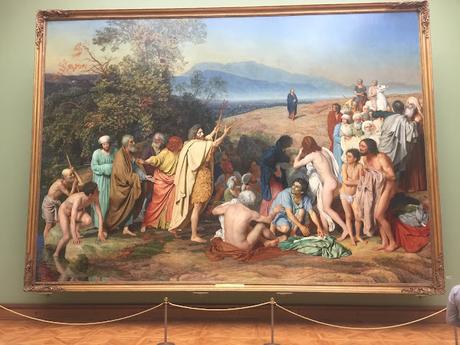Today we think of John the Baptist.
Tretyakov gallery. Huge canvas. Ivanov's painting of Christ baptising by the river Jordan

In our reading the gospel writer, John the apostle (and I know of no valid reason why we need dispute that), tells us of his namesake, John the Baptist
1. He tells us that John the Baptist's origin is in God
Sent from God (v6)
2. He tells us that John the Baptist's identity is in relation to Jesus
The priests and levites ask him, 'Who are you?'
- the Messiah?
- Elijah?
- the Prophet (God told Moses that another prophet would come who would be like him: Deuteronomy 18:15)?
The answer is No!
And they ask him again (v22), 'Who are you?'
and this time he says, 'I am the voice - pointing to Jesus'.
John defines himself in terms
a) of scripture. We read this prophesy from Isaiah 40 last week
b) of his calling
We say of Jesus with Zechariah in the Benedictus: 'You child shall be called the prophet of the most high, because you will go before the face of the Lord to prepare his way'
John the Baptist came to prepare people to meet with the coming God.
In John's gospel we are only told that he baptises - in the other gospels we are told that his baptism was a baptism of repentance. He calls people to examine themselves in the light of the fact that God is coming: to examine their lives, their priorities, what they put their trust in, how they live - and he calls them to repentance, to turn away from self worship back to God.
c) of the otherness, the glory of Jesus
- he is simply the voice calling people to prepare for Jesus
- he is the servant, the envoy, the forerunner: Jesus is coming after him
- he is nothing in comparison to Jesus. Not even worthy to kneel down and untie his shoelaces.
Catherine of Siena (C14th Italian mystic) wrote of an encounter she had with the risen Lord Jesus. He said to her,
“Do you know who you are and who I am? If you know these two things, you will be blessed and the Enemy will never deceive you. I am He who is; and you are she who is not.”
Contrast that with the ones who come to Jesus here: the priests and Levites
John is sent by God (v6) and he is accountable to God
They are sent by the Jewish rulers (v19, v24)and they are accountable to the ones who sent them (v22)
So we have here a divide
The one sent from God, whose identity is in God, whose calling is in God, who sees and knows Jesus and who points people to Jesus. He is answerable to God
The ones sent from the world, whose identity is in the world, whose calling is in the world, who are blind to Jesus ('among you stands one whom you do not know'), and who are answerable to the authorities of this world.
Who are we with?
How would you answer that question: who are you?
A father, a mother, a grandparent, a widow or widower, a farmer, a vicar, a churchwarden; or perhaps we define ourselves by our sexuality or relational status; or perhaps we might think I once was somebody but I am now nobody.
I seem to be meeting at the moment former senior people who are looking for a new identity and purpose and who, it has to be said, are lost.
Listen to John the Baptist.
Look at who he is pointing to.
If you can see (even very dimly): in his word, in what we are doing now, in the gifts of the bread and wine, in your neighbor or in this creation, the person he is pointing to - Jesus, and if you are beginning to put your trust in him - then you are a child of God.
'To all who received him, who believed in his name, he gave the right to become children of God' (John 1:12)
Your origin is in God, your purpose is in God, your calling is in God (whether as father or mother or grandparent or vicar or farmer or shopkeeper or even in temporary lostness - and even if you really do not know who you are or what you are called to do: perhaps follow John the Baptist and say that you are someone who wants to point people to Jesus), your accountability is in God and your destiny is with God.

